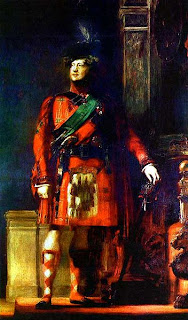Today marks the 266th anniversary of the Battle of Culloden, the last pitched battle to be fought on British soil and the battle that ended the Jacobite Rebellion of 1745.
In 1745 Bonnie Prince Charlie gathered forces from Ireland, the Highlands and Lowlands to fight for the restoration of the English monarchy to the Stuarts. His forces, exhausted from a long march and short on rations met those of the Duke of Cumberland on the Culloden Moor on April 16, 1746. The battle was bloody and short, lasting only an hour. The Jacobite forces were decimated, the wounded slaughtered, and the survivors hunted down, imprisoned and executed. This harsh treatment of the enemy earned the Duke of Cumberland the name of “The Butcher.”
Bonnie Prince Charlie was pursued throughout Scotland with a price on his head of £30,000, but he managed to escape and make his way back to France. Subsequent to the battle, efforts were made to break up the clan system and highland dress was forbidden.
Ironically, it was a visit by George IV in 1822 that would restore a sense of Scottish identity and unify the Highlanders and Lowlanders in the common symbol of the kilt and tartan.
During the Regency there would still be a few people alive who endured the battle first-hand and others whose grandparents or parents were alive then. I wonder what the Regency era aristocracy knew of the battle. Did they think of it as we might WWII? What did the Scots think? Did they harbor resentment for what happened 60 years before?
I suspect for the Scots, emotions about the battle still ran high. A few years ago I mentioned to two friends of mine, both of Scottish descent and both writing Scottish Historicals, that my great great paternal grandmother was a Campbell. Well, this did not impress them at all. It turns out that the Campbells fought on the English side of the Battle of Culloden. My friends still considered them traitors.
What do you think Regency era Englishmen and Scots thought about each other and about the battle?
(Take a peek at my new bookcover and enter my website contest!)



I have a Campbell grandmother in the family tree, who married the McNeil laird of Colonsay. One of their grandsons married a Cameron from Locheil (though I haven’t discovered exactly who her parents were)in 1751. That same grandson was a captain in the English army. I have no idea how Culloden affected the family interactions, although the grandson is buried in the McNeil family crypt on Oransay with his parents.
Hey, Karenmc! That makes us kin!!!
Considering the Duke of Cumberland’s genocidal attempt to extirpate the Highlanders after Culloden, it should hardly be surprising if the survivors harbored some ill feeling about the English, even 60-70 years later.
I think you are right, Lil. If feelings are still strong after so many generations, certainly they’d have been strong after a mere 60 years.
Diane, I was off a generation (that’s what I get for relying on my memory). The Colonsay laird was Malcolm McNeill and his wife was Barbara, who was one of many generations of Campbells at Dunstaffnage, Argylshire. The army captain was their son, Malcolm, and his marriage to Catherine Cameron was in 1754. I’m descended from their son Henry, who arrived in the Carolinas as a teenager. Do any of those names ring a bell?
Karenmc, I only know my paternal great-grandmother was a Campbell. She was the only Scottish connection in my family. I don’t know anything about her parents.
My family traces back to a branch of the Clan Donald, and when I visited Scotland in 1986, there is still bad blood between the Clan Donalds and the Clan Campbell, since the 12th century. The Campbells have been the bad guys through the centuries.
“Most importantly, the attitude of all Highlanders coalsced into a loathing for the Campbell clan after the massacre at Glencoe in 1692. ” There’s a song about this. Our tour guide played it for us and told us the history.
Here’s the link:
http://www.heartoscotland.com/Categories/CampbellsandMacDonalds.htm
Omigosh. I think I’d better keep mum about having Campbell blood in me!!!
Almost all of my other ancestors on both sides come from Alscace Lorraine.
I think the Campbells are proud of their history, since they were usually on the winning side. Just have to be aware when sharing your history. 🙂
When you look at the events of Culloden and the aftermath, it is hard to think that a mere 60 years would erase the brutal and vicious nature of the battle and the slaughter that followed as men, women, and children were killed. Add to that the attempt to destroy the culture and heritage of the country, and who could blame the Scots for holding a grudge for many years, even generations.
Sad to say, but genocide seems to be a tactic the English were fond of using to get their hands on land they wanted. Sorry, that is from the descendant of Irish farmers forced out by the Potato Famine which was exacerbated by the English so they could force the Irish off their land.
After all that, it must be remembered that this generation had nothing to do with events hundreds of years ago. Understand the events and their effect, and don’t allow similar things to happen in the future. Scotland was fortunate that it was able to regain/retain much of its culture and heritage in spite of the attempts to destroy it.
Yeah, librarypat. I can’t think about what the English did to the Scots or to the Irish. It ruins my love affair with the country. A truly shameful part of English history.